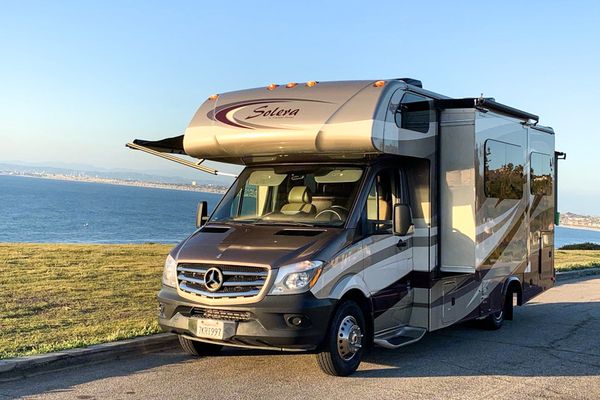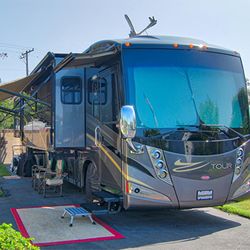
Helpful Guide: Sales Tax on RV in California (Luxury Tax)
Whether you like it or not, there is a tax somewhere in every state. The problem is that these tax assessments are never fair. Even in the state of California, the sales tax is not really that fair. It is just expensive
The amount of sales tax you will pay in California varies from county to county. You can pay as little as 7.25% in one county while paying up to 10.25% in another. It is not a fair system but it is California and taxes are high in this state.
To learn more about paying sales tax in California, just continue to read our article. It has the information you want to know about before you buy your RV or trailer in that state. Watch out for out-of-state registration as well. States are cracking down on it.
What is The Sales Tax On an RV in California?

This will depend on the county you live in. To find the most accurate rate, you should check with your local DMV office or tax office. Rates will change when lawmakers make changes and that can happen at any time.
Currently, if you are living in Los Angeles County you will be assessed 10.25% sales tax on the purchase of your RV. If you happen to live in a county like Ventura, then your sales tax will be lower.
The rate for that and other counties is 7.25%. Other counties will fall between those two figures. What makes this trickier is that you can live in Los Angeles but store your RV in Ventura county or some other low sales tax county.
That storage address will lower your sales tax rate to the 7.25% level. There are ways to lower your sale tax bill but law enforcement is using a Big Brother type of strategy. They are asking residents to rat you out if you drive regularly on California roads with out-of-state plates.
You have to be careful when you try to save money on paying taxes. The government always wants its fair share.
Do You Pay Sales Tax On a Used RV in California?

Yes, you will have to pay sales tax when you buy a used RV in California. The state law requires that all people buying a vehicle in the state must pay sales tax. The going rate for used is about 7.25% but do not quote us on that.
A used RV purchase in Los Angeles county may still cost you that high 10.25%. Make sure to double-check with the tax office to get the exact rate you have to pay in your county. Rates change as do applications of taxes so never take anyone’s word for it.
There are a lot of ideas floating around the internet about how to save on your California state sales tax. You better be careful when thinking about trying any of them. The information may be old and out of date, or laws may have changed.
Since CHP has been instructed to start cracking down on out-of-state registration, it may not be the best idea to go to another state and buy your one or used RV.
The fines could be heavier to pay than the sales tax. Not to mention what it will do to your driver’s license fees and other registration costs on other vehicles.
California Resident Buying RV Out Of State

This is the main alternative most website writers are talking about as the best option to take. They recommend that you buy and register out of state to save on California taxes.
One option is to buy your RV and plan to use it 51% of the time out of state for the first year. This may be done by buying and registering your RV out of state and then staying out of California for at least 51% of the time.
After one year, there is no sales tax payment to make. But like all strategies, double-check on the laws governing this type of move. If you have an out-of-state address already, you can buy in that state and lower your tax obligation.
But you should check with the California Francisco Tax Board website. Laws change so it is best to get the information from the people who create the laws. Don’t rely on second or third-hand information as someone may not be aware of those changes if any have taken place.
As we said, California and other states are cracking down on out-of-state registrations. You may be tagged even if you are out of the state for 51% of the year.
Is There a Property Tax On An RV in California?

As far as we can tell, no there is not any property tax on RVs in this state. Property tax is levied against the permanent property and RVs are not considered permanent property.
While the term mobile home is used to describe many RVs, in California, a mobile home is defined as a manufactured home. That type of temporary home can be permanently placed on land or in a mobile home park.
We have not seen an RV mentioned as property in the way a regular home or manufactured home is referred to. In other words, there should not be any property tax on an RV.
But as we have said continually throughout this article, double-check with your local tax authorities to make sure. It is best to get your information from them as they will be current on all laws pertaining to taxes and RVs.
Be careful when checking the different RV discussion forums. The owners there are not all from California, do not buy or register their RV in that state, or are not current with the laws at this time.
California Luxury Tax on RV

Not that we have seen. The only tax that we have come across is the sales tax plus fees on registration and other fees the state of California dreams up. We have not seen any mention of a luxury tax but that may be a hidden cost somewhere along the line between purchase and registration.
One of the things that complicate a search for this topic is all the nonsense or bad websites that use that title to get people to click on their links. We ran into over 20 such websites all in a row on the first page of results.
Their content is only gibberish but misleads people wasting their time as they provide no legitimate information. Because of this, we will advise that you contact your local tax office or DMV to get the full list of taxes levied against RVs and trailers.
Those government offices will be the best ones to talk to as they will have the current list of taxes you need to be concerned about. You can call them up and talk to them or send them an e-mail through their website, etc.
When it comes to taxes it is best to go to the source.
Is RVs Tax Deductible in California?

There is a possibility to do this. The key is that you are deducting your sales tax only from your regular tax statement. You can also deduct the ad valorem tax which is a tax based on your RV’s value.
The hitch for both of these deductions is that one, they are a one-time only deductions. Two, you must do it in the tax year you made your purchase. You cannot wait 5 years down the road when it is more beneficial for you to make deductions.
If you have a loan on your RV, it may be possible to deduct the interest payments from your taxes. This possibility and the other two deductions are best discussed with your accountant.
There is also a possible business deduction but there are strict rules governing writing your RV off as a business expense. The same goes if you are renting your RV. There are possibilities you can take advantage of when you do this financial move.
The key is to talk to your accountant or tax preparer about the details. They should have all of this information handy when it comes time to fill out your tax forms. Just make sure to keep your receipts, records, and other documents organized, up to date, and so on.
Some Final Words
Paying taxes is never any fun. However, they must be paid even for RVs. The biggest concern you will have will be the sales tax when you buy a new or used RV. Just make the right decisions on where you register your new vehicle or trailer.
Most important, talk to experienced tax people to make sure you get the correct information. Don’t rely on second or third-hand reports. Always double-check to make sure you know what you can or can’t do tax-wise.

